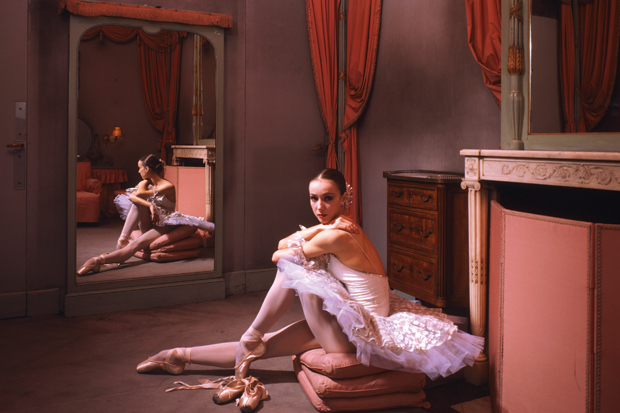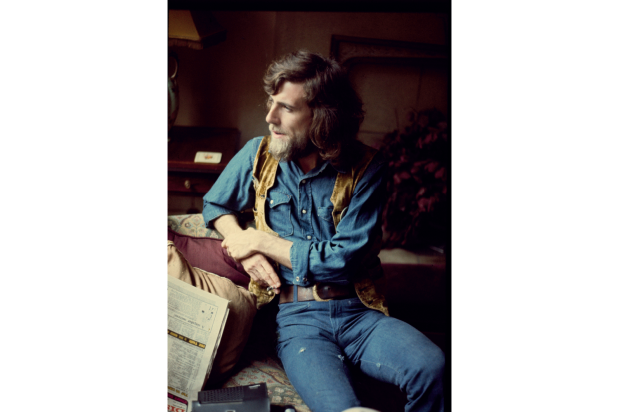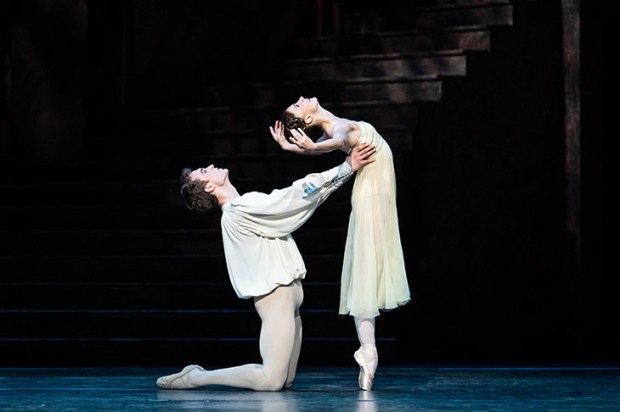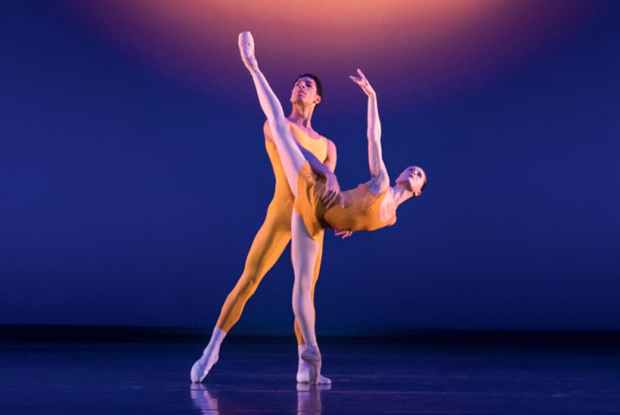If you follow dance or music closely, make them part of your life, you look on certain performers as your daemon. These are the artists who become part of your inner landscape. They act as a tuning fork for your emotions and imagination. And you mark their progress with particular hope that you won’t be disappointed. When the 25-year-old Sylvie Guillem arrived in London in 1989 from Paris Opera Ballet, with a flaming reputation as Rudolf Nureyev’s prodigal daughter, one’s first reaction was wariness. She seemed so flashy in her incredible bodily gifts.
In Swan Lake, this Swan Queen showed no modesty in her headlong dives — the legs shot up in perfect verticals, they described high circles with the triumphant grace that only ultimate hard work of an ultimate natural ability can bring. We kept talking about those legs. Over at the Kirov Ballet short girls suddenly fell out of favour, and six o’clock legs became standardised in ballet classes.
But you don’t adopt a dancer as your daemon because of her legs. When last week Sylvie Guillem announced through Sadler’s Wells that she’ll retire from the stage next year (she’ll be 50), not only did the nation’s dance critics burst out in lamentation, but the Times and the Telegraph made it page one news. For at least 20 years Guillem has been regularly described as the greatest ballerina of this era, as the art’s game-changer.
‘Ha-ha!’ she laughs down the phone. She has a very infectious laugh, like a peal of bells. ‘Well, I suppose it’s better than being the worst ballerina of the time. But a lot of people will say to you that they can’t stand the way I dance, they hate me. Bon. You can’t please everybody.’
Hate, love — Guillem’s ability to inspire extremes makes her place long-term in ballet quite tricky to assess. She’s become this era’s supreme objet d’art, recognised by external features, the hyper-physicality, the stubborn girl-power decisiveness in a world where graceful compliance and team play have been the norm. Ballet is an artistic army, its discipline is communal, the style of any company dictated by synchronised gracenotes and obedient corporate intonation. It was a frustrated Royal Ballet director, Anthony Dowell, who gave Guillem the indelible nickname of Mademoiselle Non.
I wondered how conscious Guillem has been of the audience to whom she has been an exhibit all these years. She said she can’t see much from the stage. ‘When you can see them, people are sometimes a bit embarrassed about being seen. When people started sending me personal messages I could see it wasn’t just a good time that they were having for an hour or two at the show, it was having an effect on their lives. People would say, “Please never stop, you’ve changed my life, I wait for your show, to travel and see you is important for me.” It’s scary in a way too but it becomes a responsibility, a duty not to deceive them.’Margot Fonteyn was British ballet’s Madame Oui, the exception but crucially also the rule. Mademoiselle Non insists that her more sceptical mission was always to search for purer and more direct emotional contact with the audience, on behalf of the characters created by the choreographers, not just to obey rules. In fact, the way she talks about some of the characters she’s inhabited — Manon in Kenneth MacMillan’s ballet, Natalia Petrovna and Marguerite in Frederick Ashton’s ballets — it’s as if she herself has wrested these fictional women away from the choreographers to become her daemons, just as I have made Guillem one of mine.
I wish that a mission not to deceive the public was more common. I’m grateful that Guillem takes her public’s emotions so seriously, and happy that she says she’s hugely critical of performers who don’t see their responsibility to this ‘special place’, the stage. It may be one reason why some people feel cautious about her performances. For many in the institutions, ballet is a decorative affair above all, a fulfilling of an aesthetic ritual — that was the Paris Opera way that Guillem wanted to leave.
‘I loved being at the Royal Ballet. Those choreographers, MacMillan and Ashton, they knew how to translate complicated life into choreography. Manon is not stupid, Marguerite is not stupid, A Month in the Country is not stupid — they are rich, you can go as deep as you want. The stage is like a magnifier of thoughts and emotion and vibration, that’s what the stage is incredible for, because it makes you live other lives, it makes you experience other emotions, it makes you feel more beautiful, or more alone, or more angry, it makes you feel much more, more, more.’
Her classical leads were more of a Marmite experience, the exquisite individualism sometimes wrenching the desirable ensemble out of true style. On the other hand, she was unique in being able to convey total technical command with an unapologetic French epicureanism. To revel in one’s highest skills — that’s a baroque pleasure we need more of.
A costume designer once told me about a row over a Manon dress, when Guillem wanted a historically inaccurate bust seam to give her more bosom. She laughs like a drain. ‘Ha-ha-ha! Well, when you’re a dancer it’s not easy to have big boobs, so I ’elped it a little bit to be the woman I wanted to be. You know those beautiful cleavages that look very feminine, and welcoming, and the breast is soft and inviting? I wanted that, but he wanted it flat, flat, flat.’ Which, as the world saw when Guillem insouciantly photographed herself nude for French Vogue in 2001, was the basic state of affairs.
I suspect a cultural mismatch lay behind the awful clash between the ballerina and the Royal Ballet’s artistic director Monica Mason in 2002. After slamming the door behind her at Covent Garden, Guillem called Mason ‘stupid’ and her choices mediocre, while Mason rejoined in more veiled language that Guillem was over the hill.
Over the hill, not. Arguably since then Guillem has made her most important contribution to British dance, single-handedly igniting a terrific new wave of choreography, making world names of her adventurous Royal Ballet colleagues Michael Nunn and William Trevitt (the Ballet Boyz) and of the then obscure Russell Maliphant and Akram Khan. She has ensured that Maliphant and Khan will remain indelibly associated with her by commissioning new creations from them for her farewell programme next year.
And then what? There is an even more challenging Guillem waiting in the wings. Five years ago she went vegan. ‘I am stronger as a vegan than I ever was with meat and dairy.’ I am unable to make any judgment about her assertion that as a vegan driving a four-by-four she leaves less environmental footprint than a meat-eater on a bicycle — which she used to be in London. But her argument, characteristically, is one of the extreme liberalism of the very rich. She no longer resides in England and France paying taxes to societies whose activities she thinks are destroying the world, but in Switzerland (with husband and two dogs), sending her support instead to the ecological causes she thinks will save it. All of us can and should make a decision, she says. ‘What I can do I will do. No one person can change the world, but one, and one, and one add up.’
More of this is to come, it seems. But first Guillem longs for some experience of the wider world, of the normality she missed after stepping on to the treadmill of ferocious physical and mental conditioning.
‘I would like to maybe do nothing for a while. I would like to see if I can really see with my eyes, smell the air …you see what I mean? It’s like you run everywhere, you live every day, you think this, that, you read this, that …and actually now I’m going towards something that is unknown. Who knows? Maybe I will become a hermit. Or maybe I will go on a boat for four months. I just want the space to discover what I want to do.’
Got something to add? Join the discussion and comment below.
Get 10 issues for just $10
Subscribe to The Spectator Australia today for the next 10 magazine issues, plus full online access, for just $10.
You might disagree with half of it, but you’ll enjoy reading all of it. Try your first month for free, then just $2 a week for the remainder of your first year.














Comments
Don't miss out
Join the conversation with other Spectator Australia readers. Subscribe to leave a comment.
SUBSCRIBEAlready a subscriber? Log in